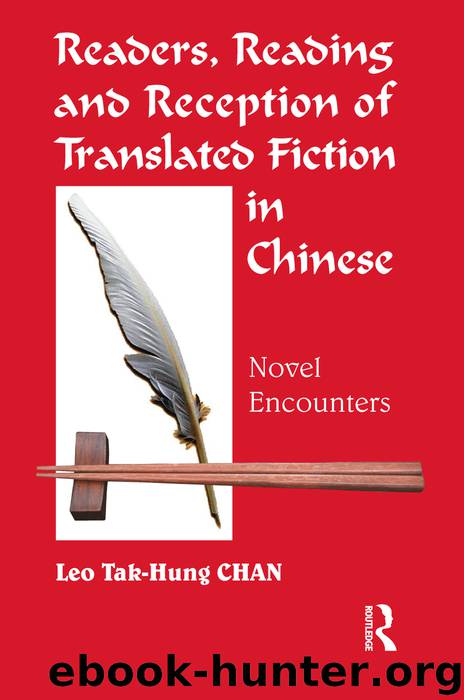Readers, Reading and Reception of Translated Fiction in Chinese by Chan Leo Tak-hung

Author:Chan, Leo Tak-hung.
Language: eng
Format: epub
ISBN: 978-1-317-64122-3
Publisher: Taylor & Francis (CAM)
Reader Responses to Translated Fiction in the 1980s
One might first begin with the late 1970s. During the Cultural Revolution (1966-76), the antipathy of the Chinese government toward Western literature, often castigated for spreading bourgeois and liberal attitudes, was reflected in the dearth of translations from European and American authors. Virtually all the translated modern Anglo-American novels were unofficially and privately circulated, and access to the government-sanctioned translations was restricted – they were meant to inculcate in a small, elitist clique rudimentary cultural knowledge about the West. According to post-Revolution memoirs written by literary figures some years later, many intellectual youths of the 1970s took the risk of carrying translated novels with them to the villages where they were dispatched to engage in hard labour. Kong Jiesheng admitted to having read over two hundred foreign classics under such circumstances, among them Tolstoy’s Anna Karenina (Zhao 2003:2).
Along with the Gang of Four’s removal from power in 1977 came a radical turnaround in the official policy on translations, and some presses were allowed to reissue translations published before the Cultural Revolution, as well as put into circulation works previously meant only for ‘internal (official) consumption’. Looking back some twenty years later, a number of readers who eventually became writers themselves wrote nostalgically of the exuberant mood of 1977: book-lovers queued outside bookstores all over the country and scrambled for reprints of translated classics by publishing houses like People’s Literature. Chen Danyan spoke of Shanghai readers’ insatiable hunger for the translations. Cao Lei described how books were sold as soon as they were placed on the shelves (Zou 2000:349-50). Zhang Shijun gave a fictionalized account of the scene at a Chongqing bookshop (quoted in Zhao 2003:5):5
All the gleeful book buyers carried stacks of books out of the book-store. No choice had to be exercised, for they bought all the classics that were available. The Book Famine had lasted too long. If you are starved you cannot be selective. That day, Yiqiong bought Old Goriot, Eugenie Grandet and Anna Karenina. The pattern of green lines on the yellowish cover, the words of the title colored brown, oh God, it’s such a pleasure just to run my hand over this classic!
Remarks by readers on their own encounters with translated fiction during the 1980s are perhaps not so rare as fictional (as opposed to real-life) representations, but they are still a rarity. Comments in which a subjective, empathetic response is reported appear in Zou Zhenhuan’s study of the translation publishing scene in Shanghai in the 1980s (Zou 2000:364-66). Also recoverable through newspapers and their weekly supplements are the following remarks by readers reminiscing about their reading or purchasing experiences (‘I Buy, Therefore I Am’), at a time when translations from the West – and not from the Soviet Union or Eastern Europe – began to appear, just as China was opening to the outside world:6
It did not matter what kind of novelist Maugham was, how authentic his characters were, or whether the story was logical. All that
Download
This site does not store any files on its server. We only index and link to content provided by other sites. Please contact the content providers to delete copyright contents if any and email us, we'll remove relevant links or contents immediately.
4 3 2 1: A Novel by Paul Auster(12382)
The handmaid's tale by Margaret Atwood(7761)
Giovanni's Room by James Baldwin(7334)
Big Magic: Creative Living Beyond Fear by Elizabeth Gilbert(5767)
Asking the Right Questions: A Guide to Critical Thinking by M. Neil Browne & Stuart M. Keeley(5766)
Ego Is the Enemy by Ryan Holiday(5424)
The Body: A Guide for Occupants by Bill Bryson(5086)
On Writing A Memoir of the Craft by Stephen King(4938)
Ken Follett - World without end by Ken Follett(4726)
Adulting by Kelly Williams Brown(4569)
Bluets by Maggie Nelson(4550)
Eat That Frog! by Brian Tracy(4528)
Guilty Pleasures by Laurell K Hamilton(4443)
The Poetry of Pablo Neruda by Pablo Neruda(4100)
Alive: The Story of the Andes Survivors by Piers Paul Read(4025)
White Noise - A Novel by Don DeLillo(4006)
Fingerprints of the Gods by Graham Hancock(3999)
The Book of Joy by Dalai Lama(3978)
The Bookshop by Penelope Fitzgerald(3848)
